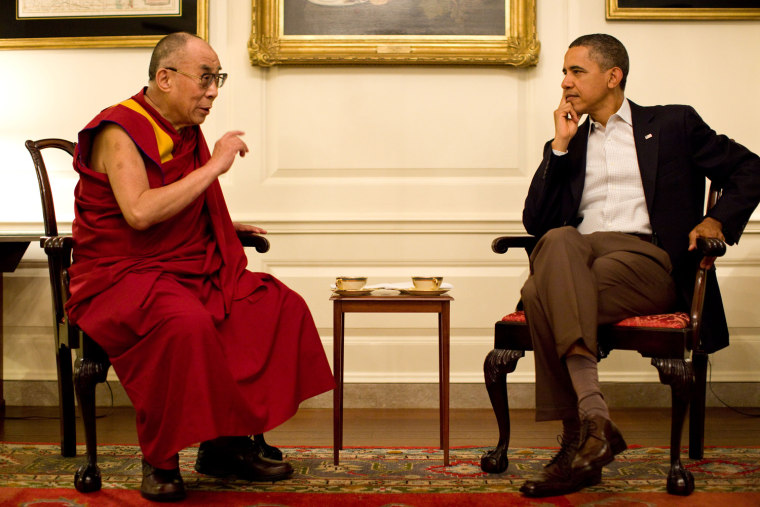President Barack Obama met Saturday with the Dalai Lama — a fellow Nobel Peace laureate — and China isn't happy.
China on Saturday called on the U.S. to rescind the invitation.
The Tibetan spiritual leader has been in Washington for an 11-day Buddhist ritual. Thousands of expatriate Tibetans joined a 76th birthday celebration Wednesday for the Dalai Lama, who recently relinquished leadership of Tibet's government-in-exile.
The White House said that during the 45-minute private session in the Map Room, Obama "underscored the importance of the protection of human rights of Tibetans in China." In a statement issued after the meeting, the White House also said Obama reiterated his support for the preservation of Tibet's religious, cultural and linguistic traditions.
Obama restated U.S. policy that it does not support Tibetan independence, a goal that the Dalai Lama said he also does not seek.
In a nod to the criticism from Beijing, Obama also stressed to the Dalai Lama that he considers a cooperative relationship between the United States and China to be important, according to the White House statement.
In remarks after the meeting forwarded by Kate Saunders from the International Campaign for Tibet, the Dalai Lama said of his visit with Obama: "Firstly we developed a very close sort of feeling for each other." He said Obama expressed his concern over basic human values, such as human rights and religious freedoms. "So naturally he shows genuine concern about suffering in Tibet and other places."
A Chinese crackdown led the Dalai Lama to flee into exile in India in 1959. China says he's welcome to return if he drops his separatist activities, accepts Tibet as an inalienable part of China and recognizes Taiwan as a province of China.
Hours before the Dalai Lama's arrival, the Chinese Foreign Ministry urged the White House to cancel the visit.
Afterward, China said the meeting had damaged relations with the United States, Xinhua news agency reported on Sunday.
"Such an act has grossly interfered in China's internal affairs, hurt the feelings of Chinese people and damaged the Sino-American relations,'' Xinhua quoted Chinese Foreign Ministry spokesman Ma Zhaoxu as saying in a written statement.
"We demand the U.S. side to seriously consider China's stance, immediately adopt measures to wipe out the baneful impact, stop interfering in China's internal affairs and cease to connive and support anti-China separatist forces that seek 'Tibet independence,''' Ma said in the statement.
The White House kept the meeting low-key, closing it from news reporters and photographers. It chose the Map Room for the visit instead of the Oval Office, which is reserved for visiting heads of state.
The visit comes less than 10 days before U.S. Secretary of State Hillary Rodham Clinton is expected to visit the southern Chinese city of Shenzhen. Vice President Joseph Biden is also scheduled to visit China this summer, followed by a trip to Washington by his Chinese counterpart, Xi Jinping.
Obama had been criticized by pro-Tibetan activists for putting off an invitation during the Dalai Lama's stay in the capital. White House officials said the president's schedule had been occupied with debt-limit negotiations with congressional leaders.
Obama last met the Dalai Lama in February 2010.
Speaker John Boehner and Democrat Nancy Pelosi met the Dalai Lama during his 10-day visit to Washington.
Saturday's White House meeting came at an extra sensitive moment for China, the United States' biggest creditor, with leaders in Washington at odds over how to raise the $14.3 trillion U.S. debt ceiling in time to avoid default.
China holds more than $1 trillion in U.S. Treasury debt and would be particularly exposed should Congress fail to reach a deal by Aug. 2. A U.S. default could rocket up interest rates, sink the value of the U.S. dollar and hurt the global economy.
Beijing has urged Washington to "adopt responsible policies and measures to guarantee the interests of investors." Obama has asked for congressional leaders to give him proposals by Saturday on how to advance talks on a deal.
